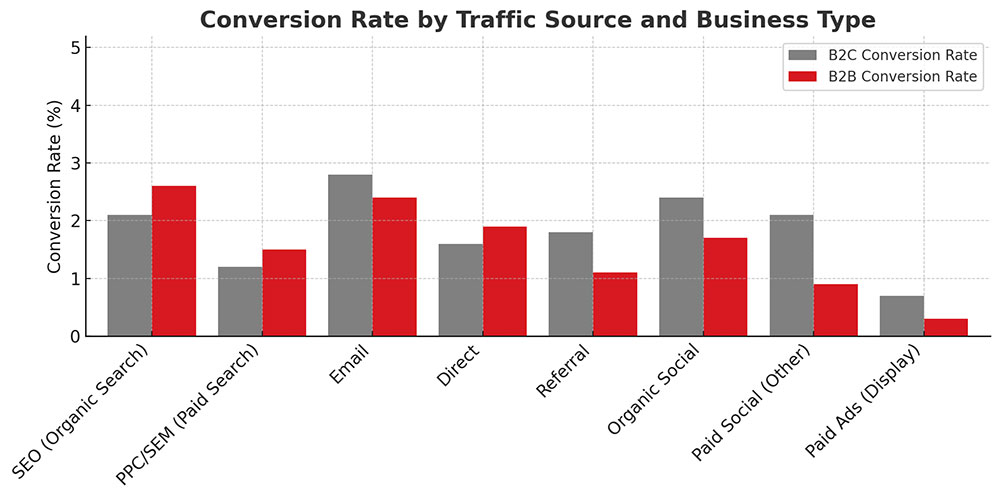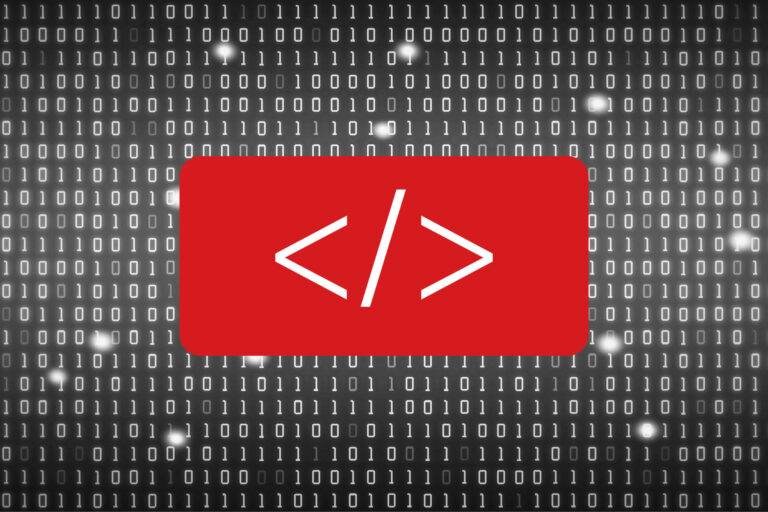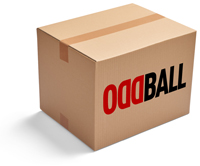Understanding the average website conversion rate is crucial in today’s digital market. It serves as a benchmark for measuring a website’s effectiveness in turning visitors into customers or leads.
Website conversion rate measures the percentage of visitors who take a desired action on a website, which could be anything from making a purchase to signing up for a newsletter, across all traffic sources. SEO (Search Engine Optimisation) conversion rates only measure the visitors coming from a single traffic source, organic search engine results.
Key Statistics
- The average website conversion rate is 6.37%*
- Website conversion rates vary greatly across industries, for example Legal services average 7.4% while SaaS and Software Development are at the lower end with 1.1%
- Traffic source plays a role in conversions, for example, for B2B, SEO (Organic Search) is the highest converting traffic source at 2.6%, while B2C converts better with Email Marketing at 2.8%
*Based on a study of Oddball client website data throughout the year of 2023
What is the Average Website Conversion Rate?
On average, websites see a conversion rate of 6.37%.
This rate is vital as it shows how effectively a website engages and keeps visitors.
Websites with high conversion rates usually have engaging content and provide a great user experience. Lower rates could be an indicator that your site may have areas for improvement.
Website conversion Rates vary greatly across industries, for example, Legal services average 7.4% while SaaS and Software Development are at the lower end with 1.1%.

The graph highlights the variance in conversion rates across different sectors, with Legal Services notably achieving the highest rate.
| Industry | Average Conversion Rate |
| B2B SaaS | 1.10% |
| Commercial Insurance | 1.70% |
| Construction | 1.90% |
| Engineering | 1.20% |
| Environmental Services | 1.30% |
| Financial Services | 1.90% |
| Heavy Equipment | 1.70% |
| IT & Managed Services | 1.50% |
| Legal Services | 7.40% |
| Manufacturing | 2.20% |
| Pharmaceutical | 1.90% |
| Real Estate | 2.70% |
| Software Development | 1.10% |
| Solar Energy | 1.80% |
| Staffing & Recruiting | 2.90% |
| Transportation & Logistics | 1.40% |
This variation highlights the importance of industry-specific benchmarks and tailored marketing strategies. A higher conversion rate in one industry does not necessarily translate to success in another, emphasising the need for a nuanced approach to digital marketing and website design.
Average Website Conversion Rates by Traffic Source
| Traffic Source | B2C Conversion Rate | B2B Conversion Rate |
| SEO (Organic Search) | 2.10% | 2.60% |
| PPC/SEM (Paid Search) | 1.20% | 1.50% |
| 2.80% | 2.40% | |
| Direct | 1.60% | 1.90% |
| Referral | 1.80% | 1.10% |
| Organic Social | 2.40% | 1.70% |
| Paid Social (Other) | 2.10% | 0.90% |
| Paid Ads (Display) | 0.70% | 0.30% |
Maximising conversion rates involves tailoring strategies to each traffic source’s unique characteristics and user intent.

Exploring how different traffic sources impact website conversion rates offers valuable insights for tailoring digital marketing strategies.
Specifically, for B2B contexts, SEO (Organic Search) emerges as the most effective channel, boasting a conversion rate of 2.6%. This underscores the importance of a strong SEO strategy in attracting and converting professional clientele.
In contrast, B2C sectors see the highest conversions from Email Marketing, with a notable rate of 2.8%. This difference highlights the significance of choosing the right channels based on your target audience to maximise conversion potential.
Average SEO Conversion Rate by Page Type
SEO conversion rates vary by page type, with white papers leading at 4.6% and hub pages at the lower end with 0.5%, the average SEO conversion rate for websites is 2.4%
| Page Type | Conversion Rate |
| Product Landing Page | 2.90% |
| Service Landing Page | 2.70% |
| Application Landing Page | 3.10% |
| Location Landing Page | 1.10% |
| Industry Landing Page | 1.80% |
| Case Study | 3.50% |
| Problem & Solution / FAQ Page | 2.70% |
| Thought Leadership Article or Blog Post | 2.00% |
| Hub Page | 0.50% |
| White Paper | 4.60% |

The disparity in conversion rates across different page types underscores the significance of content strategy in SEO efforts.
White papers, often detailed and informative, tend to attract more engaged audiences, resulting in higher conversion rates. On the other hand, hub pages, which typically serve as directories or gateways to other content, see lower conversion rates, highlighting the need for targeted content that meets specific user intents.
Need help improving your website conversion rate?
Understanding the average website conversion rate and its variations across industries and traffic sources is crucial for businesses aiming to optimise their online presence. By focusing on tailored strategies that align with industry standards and prioritising high-converting content types, companies can enhance their digital marketing effectiveness.
Looking to improve your website’s conversion rate? Oddball Marketing offers expert Website Design services to help you achieve better online visibility and conversion rates. Get in touch today to start your journey up the rankings!
Sources: FirstPageSage – SEO Conversion Rate, Industry, Traffic Source






